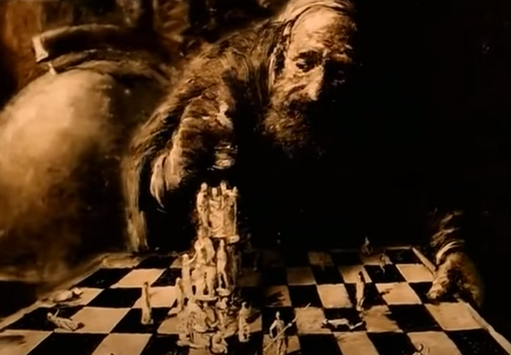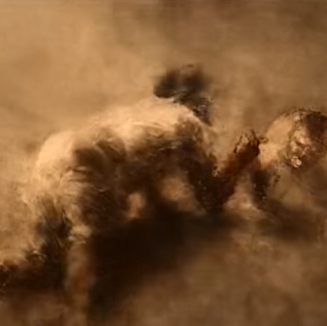The Dream of a Ridiculous Man, by Dostoevsky
- Simon Vincent

- Jan 5, 2024
- 7 min read
Updated: Jan 4
The Dream of a Ridiculous Man is a short story written by the renowned Russian novelist, Fyodor Dostoevsky. Here, Dostoevsky presents the essence of the story of humankind through a revelatory dream of a suicidal nihilist. The captivating story inspires an illuminating perspective, enabling us to see with clear eyes the suffocating matrix we have created, and the way out.
The Story
We are introduced to the last hours of a suicidal nihilist. He wanders St. Petersburg on a cold, cloudy night. The world has only given him pain and disappointment, so he hates it. Everything is meaningless, he believes. There is no God, no purpose, and therefore no reason to live. There is no reason for anything, even to do good. Suddenly he hears the desperate pleas of an innocent little girl, who rushes to him, tugs his coat and begs him to help her. Her mother is in some sort of emergency, and the little girl is alone and afraid. The "Ridiculous Man", however, ignores her. He shrugs her off. The world is cursed and will die anyway. He has decided to kill himself. To "become zero". So what does it matter if he helps this girl?

The Ridiculous Man continues home, walking pass a multitude of beggars and impoverished civilians. But he does not pay attention to them. His mind is filled with self-pity, lamenting the darkness he feels in the world.
He lives in a rowdy building filled with unruly charlatans, who rely on perverted antics to amuse themselves. There is no civility, or love. The Man sits all alone by his desk and lights a candle, choked by the insuffocating burden of nihilism. After a few sighs, he grabs the revolver. The world seems destroyed, so now, he has decided to go along with the world and destroy himself, too.
However, just as he is about to pull the trigger, he feels a sharp sting of compassion for the little girl he ignored on the street. This is bewildering to him. Why is he bothered by this nag of compassion? He is about to "become Zero", so what does it matter if the girl is abandoned or not? Nothing matters, surely, so why does he feel that he "ought" to have helped her? Suddenly the gun goes off, and the Man descends into utter darkness.
His consciousness travels into the abyss. He finds himself in space, marveling at the planets and stars. Then, he suddenly shoots down to Earth. But the Earth is not as he knew it. For some reason, the Earth is how it was "before the Fall of Man", a place where humans blissfully coexist in perfect harmony with each other and nature. There is perfect purity and innocence, and all the humans are full of radiant joy, as if they were angelic beings, beaming love in all directions. This is torturous for the Man to witness, as the contrast between him and them is painfully staggering. However, the angelic humans do not even notice his impurity. Instead, they welcome him to Earth and embrace him.

The Man begins to delight in this earthly paradise. Words cannot express the overwhelming joy and peace that rests here. But one day, he decides to play a little prank on a young woman. He dresses up as an old granny and wears a mask, sneaking up on her, before suddenly revealing his identity. The woman laughs hysterically. What irony! What foolishness! She grabs the mask and begins running around with it, replaying the prank on others.
Her playfulness teases the other men, and so the sparks of seduction are stirred within them. With seduction comes a prideful desire to "take", and when one of the men gets the lion share of the woman's sensual attention, the other man becomes bitter. He is jealous and offended. Soon, it boils over for him, and he picks up a rock and kills the other man. Meanwhile, the comedy intensifies, and more people begin using masks and deception to stir laughter. The cycle repeats in all directions, puffing up pride, jealousy and irritation.
Feuds among men become frequent. Rivalries emerge. The humans begin competing. They form alliances, building walls around their clusters. Animals are exploited to gain a competitive edge over the other parties, but are soon objects of torment, and they begin to withdraw into the wild, afraid of the human species. Humans begin a cycle of violence against each other, driven by the lust for vengeance. To regulate this new chaos, they form opinions on what is right and wrong, and invent justice, and execute transgressors. They create nations based on various schools of thought on morality and justice. They create races and creeds, governed by hierarchies of power. And these large-scale organizations wage war against each other, convinced that evil stems from "the other". Wars bring torture, humiliations, rape, and sexual perversion.
All humans now suffer tremendously. They suffer precisely because they are so conscious of their own suffering. Due to this consciousness, they invent science to alleviate themselves from suffering, but all it does is to address the symptoms, not the root cause. The weak are oppressed and ridiculed. The mighty amuse themselves with gluttony and greed. Mutilated humans are put in circuses to be laughted at. Prostitutes multiply. New wickedness is invented. Little children weep. Many become mentally insane.
The Ridiculous Man watches all of this in absolute horror. His entire soul and mind is swallowed up in the excruciating darkness of guilt. He feels fully responsible for the entire world. It was his little, seemingly harmless, prank of deception that triggered the corruption of the entire human race. It was his fault that millions now weep.
However, the Man also feels another intense emotion: Love. Because he knew how these angelic humans were before his introduction of Mischief, he feels immense compassion for their current state. He cares enormously for them, precisely because he feels so responsibile for them all. Thus, the greater the pain they suffer, the greater the love he feels for them. His heart is deeply wounded by love.
He turns his attention to repentance. All the love and pain in his heart is channeled into ardent repentance. He is responsible for it all, no one else. He goes to all the humans on the Earth, urging them to crucify him, telling them how he was the one who infected the Earth with evil. But no one believes him. They all mock him and spit at him, and the more they mock, the more intensely he loves them. For he knows what they forgot.
Suddenly, the Man wakes up. He finds himself back in his lonely apartment - it was a dream! He throws away his revolver in utter disgust, and is jubilant to realize he is alive. He lives! He has the gift of life! He has the gift of free will! He must live now, he decides. He must. He must tell everyone about the angelic state of humanity before evil, to remind them of the beauty of innocence and the paradise it brought. He has seen what the world could be.
As he does this, he is again ridiculed, just as he was in the dream. Innocence is not fancy at the moment. Purity is not exciting, or thrilling, or entertaining. Virginity is not popular. They mock him. They would rather choose suffering than to become "innocent". But he loves them even more. Now, his life has eternal purpose and meaning - because he Loves others! Suffering remains a reality in life but now, his suffering comes from his compassion, not his depression. He suffers meaningfully for his fellow creatures, and that makes it all worth it.

Reflections
In this story, Fyodor Dostoevsky captures the History of the Human Heart. He captures the essence of humanity. Dostoevsky conveys, through the Dream, that:
There existed a Paradise, harmonised by the perfect innocence and love.
We are all interconnected and inter-responsible for the world. No life is meaningless. Every life has an impact on the world, no matter how large or small.
There is such a thing as Good, because Good was before evil. This is why the Man feels a tug of compassion for the girl he abandoned, even though he has mentally convinced himself that it doesn't matter. Good exists, and it calls all of us.
Therefore, a little mischief, no matter how harmless it seems, upsets the "moral law". It weaves into the rest of the cosmos through a "butterfly effect" and participates in the corruption of the world.
People who are then born and raised in this corrupted world are at danger of deciding to subscribe to the passions of the world they inherited. They therefore participate in ridiculing innocence and love, and chasing the excitement of evil, not knowing that it only furthers their own torment.
So how do we work our way back to Paradise? Dostoevsky suggests that you need to become aware of your direct responsibility. Because you are part of the human species, you cannot pretend as if your actions go without consequences for the world around you. Even the smallest of actions, even your own little thoughts, stir a chain reaction. So, recognize your full responsibility for the creation of an evil world. This is a very uncomfortable task, but it is absolutely essential.
This must lead to repentance, and that is only done by removing your own ego and pride, Dostoevsky suggests. Lamentations with pride lead to self-pity and self-hate, which destroys. But lamentations with humility leads to repentance, which heals. For example, the Man knew the world was corrupted in the beginning of the story, but his pride and selfishness made him wail in self-pity. After the Dream, the Man still knows the world is corrupted, but since he has taken responsibility for it all, he has no room for pride or selfishness, only love for others.
The power of Love is not to be underestimated. Recall that it was a small ounce of compassion for the little girl in the beginning of the story that rung in his heart and nagged his conscience, stirring his soul into a deep self-examination through the lucid journey. This little spark engulfed his soul in the end, and saved his life from death, transforming him into an ambassador for love.
But how on earth is this possible? The Ridiculous Man only realizes this because of the intense dream he experienced. The dream is a sort of divine revelation. Effectively, Dostoevsky hopes that we all seek to experience the Dream of the Ridiculous Man in order to truly understand the depth of this message.
Hence why we need to go beyond our own creation to find our medicine. Justice, laws, and moral codes do not save us in the end, but are mere symptoms of the viral infection. What truly saves us is an existential rebirth, which leads to a desire to return to the state "before the Fall of Man" (Genesis). This strongly resonates with the Orthodox Christianity that Dostoevsky himself adhered to. In Christianity, attainment of this Love is only possible by communing with God, because God is Love.




















Comments